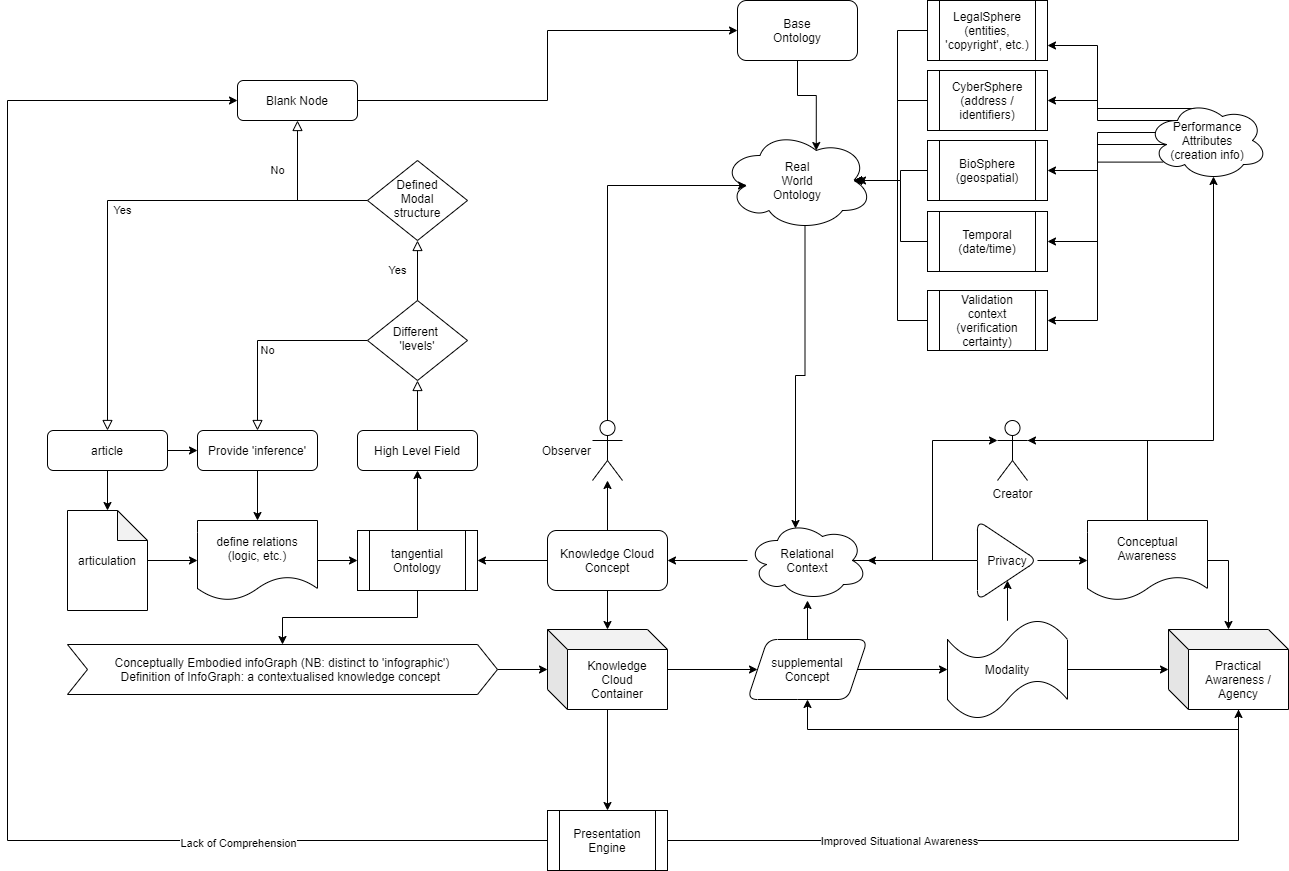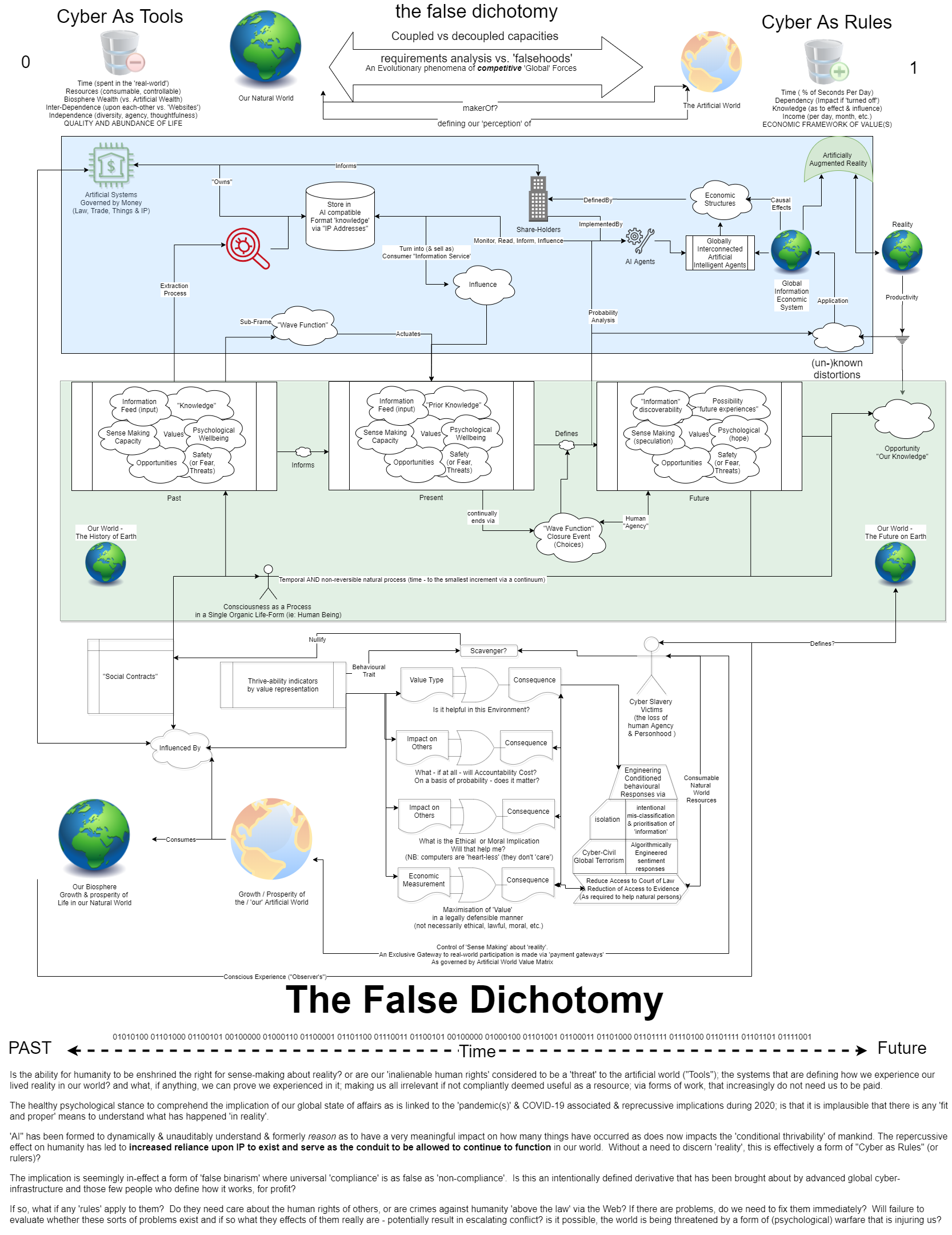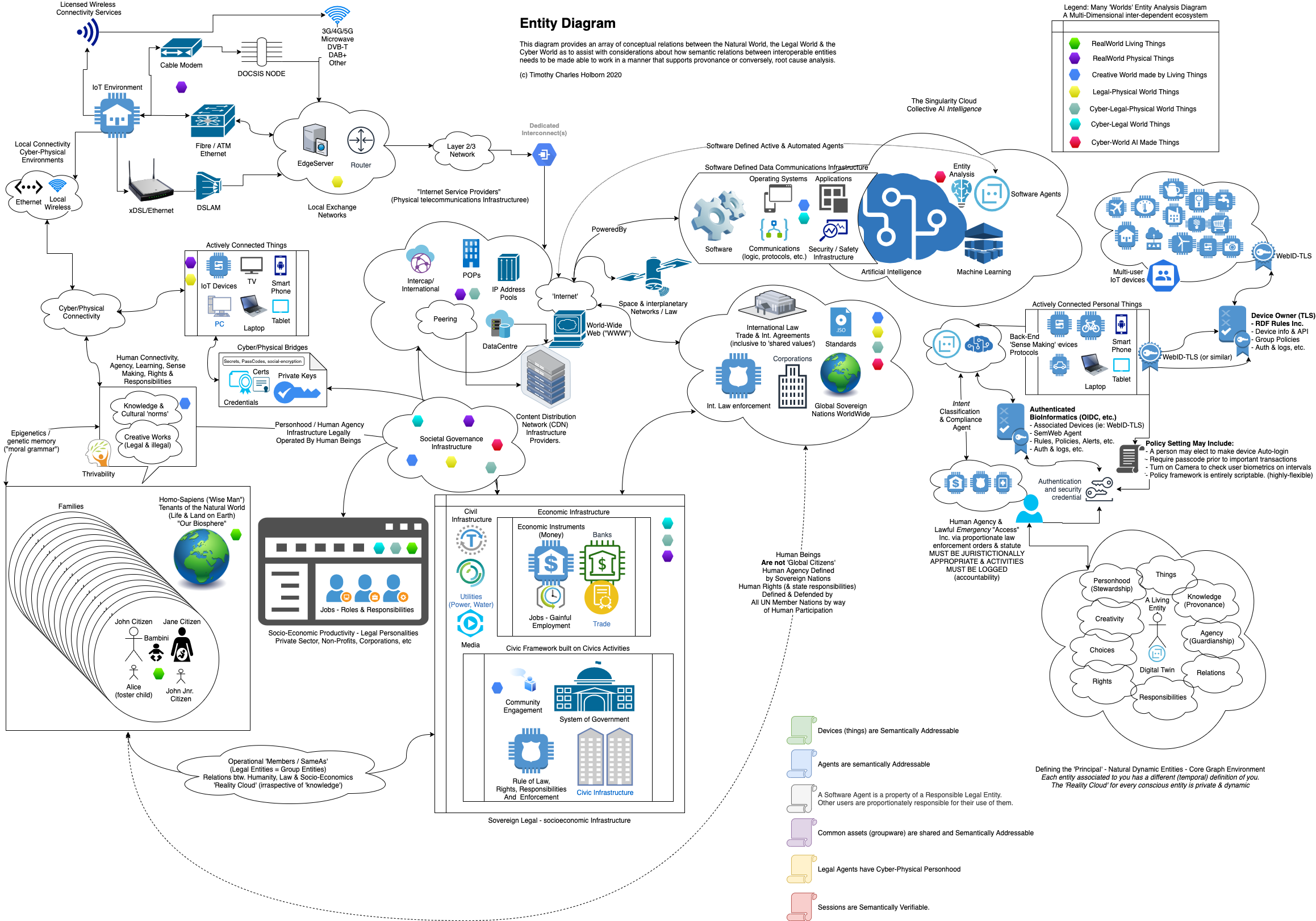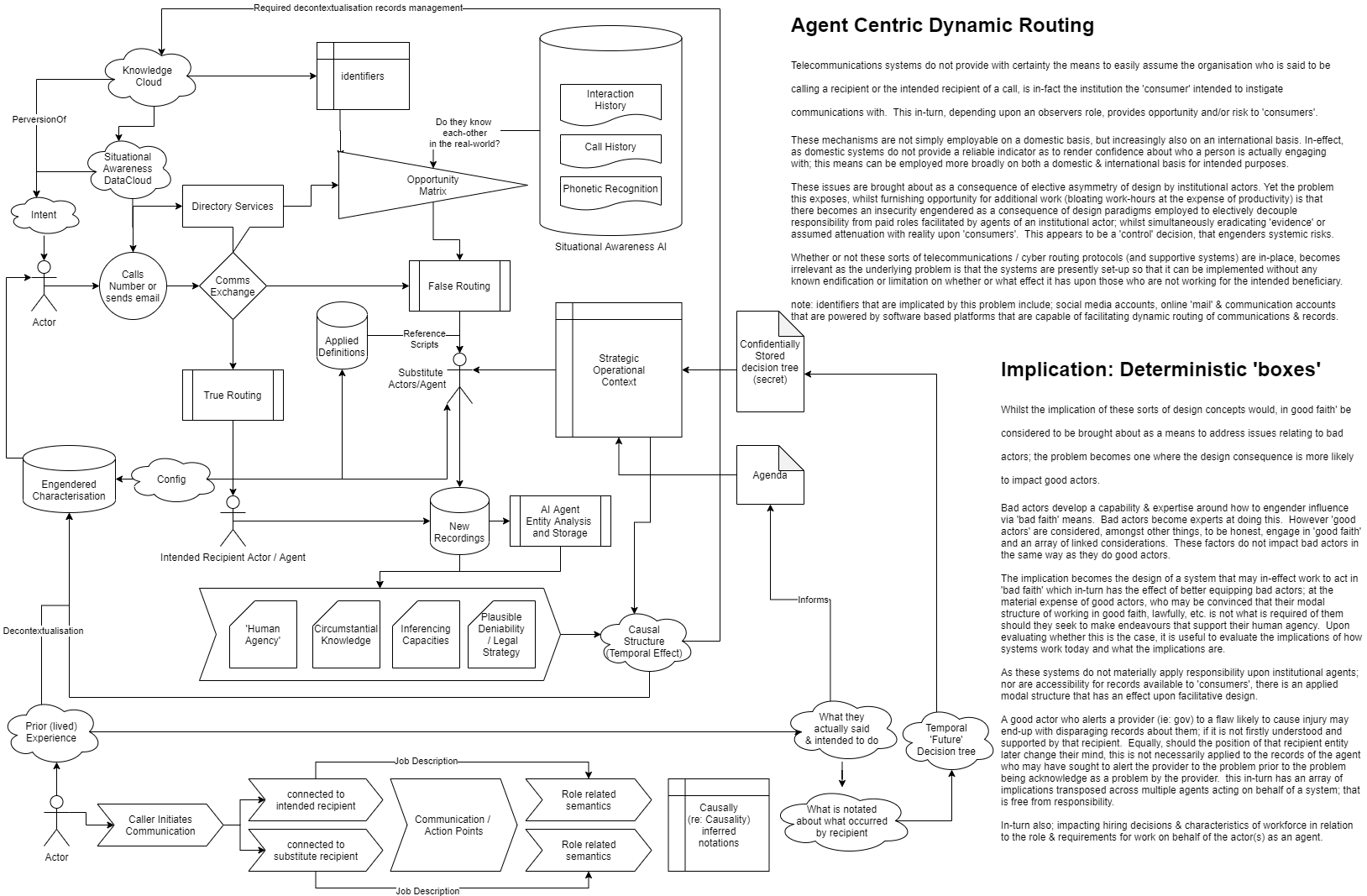- From: Timothy Holborn <timothy.holborn@gmail.com>
- Date: Mon, 17 May 2021 21:05:55 +1000
- To: public-rww <public-rww@w3.org>
- Message-ID: <CAM1Sok3NYy0EtU7wN08+QdWoLSgT2xfU_Jw4LcKk38ZgDvMhkw@mail.gmail.com>
I'm quite concerned about an underlying 'ideology' linked problem.
Therein, whilst i'm replying to the JSON-LD / SchemaOrg linked notes;
its kinda a different branch, and i guess, the fundamental link back to the
parent threads - is about ideology linked to the affordances provided to
man-kind as a competitively better solution for 'identity' management,
storage, growth, thrivability, protection and permissions-set around
usability / productivity, etc.
FWIW: I'm trying to write something about the concerns that i have about
the current position atm vs. alternatives (think VHS vs. Betamax, at a
minimum, if it were 'cakes' of 'houses', there's alot more than 2 choices)
- which is linked to this work; but not expressly (ie: its local innovation
infrastructure work, that i'm hoping will provide a conduit to support
growth of 'reality check tech'), and the notes about our international
stability / thrivability, as may be brought about via defence activities
linked to a present day definition of 'cyber' and linked issues (ie:
[1][2]) vs. some sort of alternative infrastructure, truth telling
infrastructure, cyber peace fair (fair dealings) infrastructure - as
required to support 'rule of law', etc... perhaps the problem or 'fear'
some may have; links to the way ideology has been expressed in development
of RDF solutions, from the early beginnings of it[3]... in consideration
for the sorts of things that have not been achieved, and the sorts of
issues that are prolific, but not well considered...? (bigger than the
implications of toilet-paper shortages, etc.)...
in anycase; few thoughts for the list.
Doesn't 'notation3'[4] incorporate logic; in a manner that other
serialisations 'don't do, so well'? when searching for a comparison table
of serialisations, i also found this s-rdf[5] thing...
I have an old (long) document, that i was reviewing recently; that i
called Artificium
Corpora et Sapientiae Universitas XXI --> A non-linear knowledge framework
for the electromagnetic operation of Human Experience
I won't post long documents, i understand that's often considered
counter-productive. Yet, perhaps, figuring out the objective functionality
requirements / intended outcomes - sought to be brought about by producing
a solution (whether it uses new tools, or old ones - with better
documentation?) could be a useful starting point?
IMO: the 'prosthetic extensions of self' (ie: via operating AI agents) need
to be 'dignity enhancing'... but therein, is a reference back to that
'ideological' problem...
If the way the web now functions; was considered in terms of a tender
response, where there are different 'requirements' to which 'platforms' (or
tools) are assessed on a comply / non-comply / partially comply basis -
what are those requirements? how do they support common-legitamacy between
agents?
do different classes of agents deserve differentiated considerations? or
would that be considered discriminatory? should a software agent have the
same rights as an agent that's built upon an ideology of 'corporate
personhood' which is expected to have the same rights as a 'natural person'
both in the same juristiction or elsewhere in the world? how do these
sorts of decisions impact 'reality check tech' or have the effect, of
achieving a result that actually does the opposite?
Therein - whilst it seems clear that JSON[-ld] is working well for legal
personalities (companies); do natural actors need a serialisation method,
that better supports 'logic'?
is it a serialisation method issue - or an ideology issue - which groups
attached to which serialisation methods have most progressed which
ideologies?
are they coherant or functionally dissociative?
i made some diagrams (in the interests of having quick and simple reference
points)[6]
Whilst authored via a 'flat medium', the entity diagram[7] (that i've also
attached for archive purposes); made an attempt to provide a 'illustrative'
framework, to consider the different 'spheres' or 'layers' that have an
interference pattern with; how it is '(human) identity fabric' apparatus
'kinda' functions, on a multi-dimensional level; taking into consideration
the dynamic nature (ie: causality linked stuff); associated between natural
world actors, knowledge / information (informatics), entity or 'agent'
endification; and per the 'legend' (colour coded); inter-woven
relationships (that are in-turn described in connection to a particular
method, that's been 'work in progress', but often attributed elsewhere - so
challenging at a personal health level, to spend much time doing...).
The 'quantum mechanical' implications of poor design on consciousness;and
its impact on 'observers' is becoming increasingly supported by others.
There / thereafter, notes made about the 'false dichotomy'[8] (also
attached - links to considerations had about 'binary-isms' that are
fundamentally false in 'nature', ie: a person must eat a cow in one bite
unless they want to starve to death - the point being, decision trees that
infer poor behaviours as justifiable or constructively useful method for
gainful gamification, etc.).
Which then links to the 'knowledge clouds' works[9][10] (image also
attached), which has been thought to be dependent upon 'permissive commons'
stuff, which is described (badly?) in articles i've made public on
medium[11]...
Attached also is a diagram / concept thing (draft) about
'subversionOfCommunications'.... Herein; overall, the point being,
if we are to live in an inter-national environment built upon an
infrastructure that PEACEFULLY supports humanitarian (biosphere) growth;
upon the context of 'rule of law', and other values that are inscribed in
various human rights / UN charters, declarations, treaties, etc... that is
- if we are to build an infrastructure that is intended to support those
values, and not pervert them; then, there's a fundamental requirement to
support 'common sense' in relation to 'rules' (which are often very old);
responsibilities, consequences and ability to maintain those values via
'agents' that have a capacity to inspect and judge in a manner that should
at times result in penalties; but they also need to function in a manner
that's intentionally designed not to be easily subjectable to getting
'gamed' for 'profit'. IE: a circumstance where someone may be slandered
and/or severely injured, for purposes that are fundamentally commercial in
nature - whereby the only available option should that 'agent' / person
seek to exist - be to 'freely' (or provide in an unencumbered manner) all
of that persons underlying work to those linked with an attacker, without
any form of encumbrance - as to seek 'peace' (or survivability) from an
attacker who knowingly 'gamed' the system, for commercial gains.
If the platform frameworks itself; are bonded to provenance / the ability
to present history of a scope of work / thing / field of endeavour (etc.);
then, that sort of attack vector won't so easily 'yield' a positive
economic result (motivation) via temporal gamification; therein -
suggestion / consideration is; perhaps its best to set-out the sorts of
objective purposes that are sought to be achieved...
FWIW - i started to (poorly) define some ontological work examples (some
time ago)[12] which is incomplete and not usable, as i didn't want to be
'the purpose' who was the first person to think about human rights in
relation to AI and produce a functional framework; but rather, do enough,
to demonstrate...
Its the sort of thing that's been set aside by others... certainly, i
haven't seen that sort of infrastructure operating and/or being employed by
major silos to support a functional performance assessment / implication
framework, in association to any works said to be about addressing 'fake
news' or 'ethical AI' or similar... etc...
Would a Temporal Web solution be a framework that better supports the
comfort of consumers whose environment are distorted by the operation of
it; or is it about 'reality check tech'? what are the defined
objectives?? i have some - but that doesn't necessarily mean they're the
same as the agents involved in this group...
Cheers,
Timothy Holborn.
[1]
https://www.linkedin.com/feed/update/urn:li:activity:6799959745714372608/
[2]
https://www.aspistrategist.org.au/government-needs-to-ensure-australias-digital-sovereignty/
[3] https://www.w3.org/TR/daml+oil-reference/
[4 ] https://en.wikipedia.org/wiki/Notation3
[5]
https://hal.archives-ouvertes.fr/hal-02390598/file/S-RDF%3A_A_new_RDF_Serialization_Format_for_better_Storage_without_losing_Human_Readability.pdf
[6]
https://medium.com/webcivics/inforgs-the-collective-info-sphere-67a660516cfd
[7] https://miro.medium.com/max/4634/1*yR3LJBkX1hkymsDlBDqEhQ.png
[8] https://miro.medium.com/max/3332/1*5KzkYHRy0B_OKP3aagsqhg.png
[9] https://miro.medium.com/max/2578/1*ANLhq8VK4RlVEnMOsB-Y6w.png
[10] https://medium.com/webcivics/knowledge-clouds-f3f5ef1990d9
[11] https://medium.com/webcivics/humancentricwebecosystems/home
[12] https://github.com/WebCivics/ontologies
On Mon, 17 May 2021 at 20:01, Melvin Carvalho <melvincarvalho@gmail.com>
wrote:
>
>
> On Mon, 17 May 2021 at 02:24, Kingsley Idehen <kidehen@openlinksw.com>
> wrote:
>
>> On 5/15/21 6:55 PM, Melvin Carvalho wrote:
>>
>>
>>
>> On Sun, 16 May 2021 at 00:09, Kingsley Idehen <kidehen@openlinksw.com>
>> wrote:
>>
>>> On 5/15/21 5:21 PM, Melvin Carvalho wrote:
>>>
>>>
>>>
>>> On Sat, 15 May 2021 at 18:14, Kingsley Idehen <kidehen@openlinksw.com>
>>> wrote:
>>>
>>>> On 5/14/21 3:26 PM, Timothy Holborn wrote:
>>>>
>>>> Sorry, re: clarifications,
>>>>
>>>> What did it do back in ~2011/2 when I first installed it? (Vs. now?). I
>>>> can pull the dates, but you likely have them in your licensing server?? I
>>>> was trying to do a POC via building a heritage capability as an initial
>>>> usecase, at the time.... (supporting a Hysterical/ historical society)...
>>>>
>>>> Does it have more functionality since then? I assumed the answer was
>>>> "yes" particularly given the status of "web payments" (pre credentials),
>>>> way back then (before I ended up on the lists, something, I didn't consider
>>>> would ever happen in my life, at the time)...
>>>>
>>>> Limitations linked to creating a knowledge banking framework. I started
>>>> concepts in 2000 ("information bank" or ibank) which progressed to
>>>> "knowledge banking" circa 2011/2012 after doing some work "updating" old
>>>> work, from mid 2010 (indigenous application started 2009/10)..
>>>>
>>>> I think you're first "dataspaces" demo was 2007??? V.interested in
>>>> "temporal web" / provenance solutions....
>>>>
>>>> Dignity enhancing web (vs. web slavery, or worse).
>>>>
>>>> Timothy Holborn.
>>>>
>>>>
>>>> Hi Timothy,
>>>>
>>>> Regarding Identity, Identification, Authentication, and Authorization
>>>> nothing has changed in Virtuoso.
>>>>
>>>> What has changed outside Virtuoso, via complimentary tools and services
>>>> that we provide are as follows:
>>>>
>>>> [1] Browser Extensions for creating Private Keys, X.509 Certificates,
>>>> Identifiers (WebIDs and NetIDs), and associated Profile Docs -- basically,
>>>> killing the headache left by predictable demise of <keygen/>
>>>>
>>>> [2] Setting up WebID-TLS + Delegation from a Browser so that the whole
>>>> thing "just works" and users aren't exposed to what they may perceive as
>>>> complexity re entity relationship type (and associated semantics)
>>>> triangulation
>>>>
>>>> The implications of the above are as follows, using a Chromium or
>>>> Mozilla browser:
>>>>
>>>> [1] You can create credentials using your browser that are stored to an
>>>> OS-provided Keystore (e.g., macOS Keychain) or PKCS#12 file
>>>>
>>>> [2] You can write data to a Data Space (e.g., OpenLink Data Spaces or
>>>> Solid Pod) subject to ACLs using WebID-TLS (with Delegation if so desired
>>>> i.e., kill off the UI/UX issues associated with browser restarts since
>>>> Person and their User Agents have distinguished, but related identity)
>>>>
>>>>
>>>> Tools that demonstrate these capabilities include:
>>>>
>>>> [1] YouID <http://youid.openlinksw.com/>
>>>>
>>>> [2] OpenLink Structured Data Sniffer
>>>>
>>>> <https://chrome.google.com/webstore/detail/openlink-structured-data/egdaiaihbdoiibopledjahjaihbmjhdj?hl=en>
>>>>
>>>> [3] OpenLink Structured Data Sniffer for Mozilla
>>>> <https://addons.mozilla.org/en-US/firefox/addon/openlink-structured-data-sniff/>
>>>>
>>>> As for Virtuoso, it hasn't changed bar adding support for WebID-OIDC
>>>> which enables compatibility with Solid Pods for read-write operations via
>>>> WebDAV/LDP mounting functionality etc..
>>>>
>>>> Long story short, we are still waiting for everyone to catch up :)
>>>>
>>>
>>> OpenLink certainly has been ahead of the curve
>>>
>>> I'm reminded of OSDB: https://osdb.openlinksw.com/osdb
>>>
>>> In particular this image:
>>>
>>> https://osdb.openlinksw.com/img/dastklohq01y.gif
>>>
>>> This is the kind of thing I envisage as a next iteration of the read
>>> write web
>>>
>>> The idea here being that each of those modular agents are moving in time
>>> to a certain rhythm
>>>
>>> I dont think we can easily make something like in that diagram today,
>>> aside from how the web already operates. You visit a page, you might tweet
>>> it, or share it, it gets indexed by a search engine etc. Yes, it one way,
>>> but alot of centralization build in there
>>>
>>> What if the web had a more temporal set of heart beats which the agents
>>> could be small, compact, modular, robust. Also finite in nature due to
>>> block chains being finite resources. Or as stated in paper trail some
>>> teams collaborating or competing in different contests.
>>>
>>> What is needed?
>>>
>>> - Tying read write agents to block chains using URIs (so standardize a
>>> URI scheme to hook into a block chain)
>>> - Ways to create fragments of a block chain that can live as mirrored
>>> claims (so some schema)
>>> - Ability to traverse chains in type, and data in time
>>> - Ability to save the state of the agents, as well as perhaps the logic,
>>> the code, the deployment (we have VCS for this)
>>> - Ability for state to evolve in time, so watching for changes, for
>>> deployments
>>> - Ability to identify agents (URIs) and described them (Linked Data)
>>> - Ability for agents to interact with one another, read write verbs
>>> (e.g. PUT/POST/PATCH)
>>>
>>> All this can come from leveraging existing timestamp servers, providing
>>> a heartbeat for multi agent read write systems, largely gluing together the
>>> pieces we already have
>>>
>>> Perhaps OpenLink can lead the way again here, and we can devise a spec
>>> together. The aim is that gif above. What tools can we use to get there?
>>>
>>>
>>> Hi Melvin,
>>>
>>> As you know, we are always happy to lead by example especially when
>>> specs are in place that offer critical foundation for interoperability.
>>> Personally, I believe that are a significant number of specs in place,
>>> hence our ability to quietly create the OpenLink Structured Data Bot
>>> Framework (OSDB).
>>>
>>> Going forward, we are currently looking at URIs and Blockchains which is
>>> an emerging and important frontier as you've already noted in your comments
>>> above.
>>>
>>
>> Excellent!
>>
>> So how advanced is the OSDB? What can it do? I've made a few bots
>> before, and perhaps you'll agree with me on this, they are nice enough
>> proof of concepts, but they are somewhat toothless. They lack robustness,
>> and need maintenance. Can easily be turned on or off, and very much prone
>> to race conditions. After all of this, they tend not to be all that useful.
>>
>>
>> OSDB can generate a REST-ful interaction console for any API described
>> using the OpenAPI standard or RDF (e.g., Actions described using terms from
>> the Schema.org Vocabulary). Naturally, any OSDB instance is a proxy for
>> interacting with all the Actions that it has distilled from API
>> documentation.
>>
>> OSDB was developed in anticipation of Siri and friends becomes extensible
>> via APIs. For example, simply giving Siri new skills which are basically a
>> collection of Actions.
>>
>> We are still waiting ...
>>
>>
>>
>> Let's give a test. Let's say I want to make a simple step counter. It
>> hooks into my smart watch.
>>
>>
>> You simply need the counter to be documented using either OpenAPI or RDF,
>> that's it.
>>
>>
>> It hooks into my phone pedometer, my treadmill, a bunch of stuff running
>> at the same time.
>>
>>
>> Once the step above is completed you can integrate into any device that
>> has the notion of Actions and their execution.
>>
>>
>> It then wants to store my data, and ensure that all devices can write to
>> the store without conflicts. Also, importantly the store might go down in
>> a DB or a pod or git, and it should just be able to come back up elsewhere,
>> ditto the bot that is managing all of this.
>>
>> In your terminology, "it just works".
>>
>>
>> It will "Just Work" if the IoT devices understand Actions distilled from
>> API by way of documentation using OpenAPI or RDF (e.g., using terms from
>> Schema.org or other vocabs).
>>
>>
>>
>> So how close do you think we are to this, with your bots?
>>
>>
>> The "Bot" is OSDB is really about its ability to be integrated into bots
>> rather than being a bot itself per se.. It is a Bot capability enhancer, so
>> to speak.
>>
>>
>> This is the style of thing I'd like to spec with a supra operating system
>> that offers web scale semaphores. That's what binding to a time stamp
>> server gives you.
>>
>> So, what's required to do this?
>>
>>
>> So-called Smart Agents like Siri, Alexa, Google etc.. being extensible
>> using a common method e.g., the OpenAPI or RDF standards. This hasn't
>> happened yet, unfortunately. We even assumed the API Economy folks
>> (typically anti RDF) would at least use OpenAPI (their own spec) but that
>> hasn't happened either :(
>>
>
> There are a lot of anti RDF folks out there. We've always tried to
> encourage (semantic) web standards and RDF in this group. There are more
> standards now emerging around JSON(-LD) and schema.org is becoming a de
> facto standard for the semantic web
>
> Regarding Smart Agents instead of massive centralized personal assistants,
> why dont we aim to create more decentralized and distributed personal
> agents with declarative data store state machines which operate on via
> standards (perhaps ones we create).
>
> Working with "small data" rather than "big data"
>
> But working together
>
> Dont know much about OpenAPI, would it be a good inspiration for a spec?
>
>>
>> Same stuff we've always done, link from one URI / UUID to another. And
>> have the logic respect that. So, basically middleware stuff, bread and
>> butter for openlink!
>>
>>
>> Yep!
>>
>>
>> Links:
>>
>>
>> [1] https://spec.openapis.org/oas/v3.1.0 -- OpenAPI
>>
>>
>> Kingsley
>>
>>
>>
>>> Kingsley
>>>
>>>
>>>
>>>> Kingsley
>>>>
>>>>
>>>> On Sat, 15 May 2021, 5:07 am Kingsley Idehen, <kidehen@openlinksw.com>
>>>> wrote:
>>>>
>>>>> On 5/14/21 1:07 PM, Timothy Holborn wrote:
>>>>>
>>>>> Overall; the underlying intent; was to create complex AUTH /
>>>>> Endification / Identification fabric capabilities; that could in-turn,
>>>>> support complex (hyper-private) semantics, that could only be brought about
>>>>> post-technological growth; with support of political will... i"m not sure
>>>>> that' going to happen (in the western world, first or at all); but, i
>>>>> wanted to make a note that the examples provided by openlink software
>>>>> (virtuoso) or Project Hydra (samvera nowadays?) didn't have enough
>>>>> functionality back in 2011/2; as such, i sought to improve it, to support -
>>>>> human beings, unto 'rule of law', for a moral economy, etc...
>>>>>
>>>>>
>>>>> Hi Timothy,
>>>>>
>>>>> To be clear:
>>>>>
>>>>> OpenLink Virtuoso <https://virtuoso.openlinksw.com> is a platform
>>>>> that includes a multi-protocol authentication layer. One of the many
>>>>> supported protocols is WebID-TLS. We also support NetID-TLS which is
>>>>> basically WebID-TLS decoupled from http: scheme URIs e.g., it supports
>>>>> ldap: scheme URIs.
>>>>>
>>>>> Authorization wise, our technology is driven 100% by RDF
>>>>> sentences/statements (informed by terms from relevant ontologies).
>>>>>
>>>>> I don't see limitations in RDF that aren't surmounted by the use of
>>>>> SPARQL as a Rules Language (like Datalog back in the day) re authorization
>>>>> via access controls.
>>>>>
>>>>> With the clarifications above outlined, what limitation are you
>>>>> speaking about?
>>>>>
>>>>> --
>>>>> Regards,
>>>>>
>>>>> Kingsley Idehen
>>>>> Founder & CEO
>>>>> OpenLink Software
>>>>> Home Page: http://www.openlinksw.com
>>>>> Community Support: https://community.openlinksw.com
>>>>> Weblogs (Blogs):
>>>>> Company Blog: https://medium.com/openlink-software-blog
>>>>> Virtuoso Blog: https://medium.com/virtuoso-blog
>>>>> Data Access Drivers Blog: https://medium.com/openlink-odbc-jdbc-ado-net-data-access-drivers
>>>>>
>>>>> Personal Weblogs (Blogs):
>>>>> Medium Blog: https://medium.com/@kidehen
>>>>> Legacy Blogs: http://www.openlinksw.com/blog/~kidehen/
>>>>> http://kidehen.blogspot.com
>>>>>
>>>>> Profile Pages:
>>>>> Pinterest: https://www.pinterest.com/kidehen/
>>>>> Quora: https://www.quora.com/profile/Kingsley-Uyi-Idehen
>>>>> Twitter: https://twitter.com/kidehen
>>>>> Google+: https://plus.google.com/+KingsleyIdehen/about
>>>>> LinkedIn: http://www.linkedin.com/in/kidehen
>>>>>
>>>>> Web Identities (WebID):
>>>>> Personal: http://kingsley.idehen.net/public_home/kidehen/profile.ttl#i
>>>>> : http://id.myopenlink.net/DAV/home/KingsleyUyiIdehen/Public/kingsley.ttl#this
>>>>>
>>>>>
>>>> --
>>>> Regards,
>>>>
>>>> Kingsley Idehen
>>>> Founder & CEO
>>>> OpenLink Software
>>>> Home Page: http://www.openlinksw.com
>>>> Community Support: https://community.openlinksw.com
>>>> Weblogs (Blogs):
>>>> Company Blog: https://medium.com/openlink-software-blog
>>>> Virtuoso Blog: https://medium.com/virtuoso-blog
>>>> Data Access Drivers Blog: https://medium.com/openlink-odbc-jdbc-ado-net-data-access-drivers
>>>>
>>>> Personal Weblogs (Blogs):
>>>> Medium Blog: https://medium.com/@kidehen
>>>> Legacy Blogs: http://www.openlinksw.com/blog/~kidehen/
>>>> http://kidehen.blogspot.com
>>>>
>>>> Profile Pages:
>>>> Pinterest: https://www.pinterest.com/kidehen/
>>>> Quora: https://www.quora.com/profile/Kingsley-Uyi-Idehen
>>>> Twitter: https://twitter.com/kidehen
>>>> Google+: https://plus.google.com/+KingsleyIdehen/about
>>>> LinkedIn: http://www.linkedin.com/in/kidehen
>>>>
>>>> Web Identities (WebID):
>>>> Personal: http://kingsley.idehen.net/public_home/kidehen/profile.ttl#i
>>>> : http://id.myopenlink.net/DAV/home/KingsleyUyiIdehen/Public/kingsley.ttl#this
>>>>
>>>>
>>> --
>>> Regards,
>>>
>>> Kingsley Idehen
>>> Founder & CEO
>>> OpenLink Software
>>> Home Page: http://www.openlinksw.com
>>> Community Support: https://community.openlinksw.com
>>> Weblogs (Blogs):
>>> Company Blog: https://medium.com/openlink-software-blog
>>> Virtuoso Blog: https://medium.com/virtuoso-blog
>>> Data Access Drivers Blog: https://medium.com/openlink-odbc-jdbc-ado-net-data-access-drivers
>>>
>>> Personal Weblogs (Blogs):
>>> Medium Blog: https://medium.com/@kidehen
>>> Legacy Blogs: http://www.openlinksw.com/blog/~kidehen/
>>> http://kidehen.blogspot.com
>>>
>>> Profile Pages:
>>> Pinterest: https://www.pinterest.com/kidehen/
>>> Quora: https://www.quora.com/profile/Kingsley-Uyi-Idehen
>>> Twitter: https://twitter.com/kidehen
>>> Google+: https://plus.google.com/+KingsleyIdehen/about
>>> LinkedIn: http://www.linkedin.com/in/kidehen
>>>
>>> Web Identities (WebID):
>>> Personal: http://kingsley.idehen.net/public_home/kidehen/profile.ttl#i
>>> : http://id.myopenlink.net/DAV/home/KingsleyUyiIdehen/Public/kingsley.ttl#this
>>>
>>>
>> --
>> Regards,
>>
>> Kingsley Idehen
>> Founder & CEO
>> OpenLink Software
>> Home Page: http://www.openlinksw.com
>> Community Support: https://community.openlinksw.com
>> Weblogs (Blogs):
>> Company Blog: https://medium.com/openlink-software-blog
>> Virtuoso Blog: https://medium.com/virtuoso-blog
>> Data Access Drivers Blog: https://medium.com/openlink-odbc-jdbc-ado-net-data-access-drivers
>>
>> Personal Weblogs (Blogs):
>> Medium Blog: https://medium.com/@kidehen
>> Legacy Blogs: http://www.openlinksw.com/blog/~kidehen/
>> http://kidehen.blogspot.com
>>
>> Profile Pages:
>> Pinterest: https://www.pinterest.com/kidehen/
>> Quora: https://www.quora.com/profile/Kingsley-Uyi-Idehen
>> Twitter: https://twitter.com/kidehen
>> Google+: https://plus.google.com/+KingsleyIdehen/about
>> LinkedIn: http://www.linkedin.com/in/kidehen
>>
>> Web Identities (WebID):
>> Personal: http://kingsley.idehen.net/public_home/kidehen/profile.ttl#i
>> : http://id.myopenlink.net/DAV/home/KingsleyUyiIdehen/Public/kingsley.ttl#this
>>
>>
Attachments
- image/png attachment: 1_ANLhq8VK4RlVEnMOsB-Y6w.png

- image/png attachment: 1_5KzkYHRy0B_OKP3aagsqhg.png

- image/png attachment: 1_yR3LJBkX1hkymsDlBDqEhQ.png

- image/png attachment: SubversionOfCommunications.png

Received on Monday, 17 May 2021 11:06:53 UTC